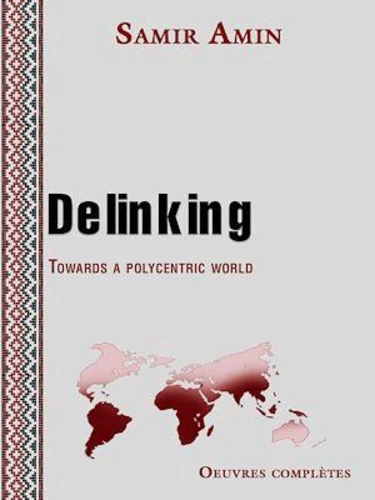Delinking. Towards a polycentric world
Par :Formats :
Disponible dans votre compte client Decitre ou Furet du Nord dès validation de votre commande. Le format ePub est :
- Compatible avec une lecture sur My Vivlio (smartphone, tablette, ordinateur)
- Compatible avec une lecture sur liseuses Vivlio
- Pour les liseuses autres que Vivlio, vous devez utiliser le logiciel Adobe Digital Edition. Non compatible avec la lecture sur les liseuses Kindle, Remarkable et Sony
 , qui est-ce ?
, qui est-ce ?Notre partenaire de plateforme de lecture numérique où vous retrouverez l'ensemble de vos ebooks gratuitement
Pour en savoir plus sur nos ebooks, consultez notre aide en ligne ici
- Nombre de pages667
- FormatePub
- ISBN978-2-37918-342-3
- EAN9782379183423
- Date de parution12/10/2020
- Protection num.Digital Watermarking
- Taille553 Ko
- Infos supplémentairesepub
- ÉditeurNENA
Résumé
Is it possible for the Third World to escape from the constraints imposed by the world's economic system? Does not attempting to do so lead inevitably to the stagnation of barrackroom socialism? What room for manoeuvre do Third World states have? Are they condemned to dependence? These are some of the questions Samir Amin confronts in this major development of his theoretical ideas. He argues that Third World countries cannot hope to raise living standards if they continue to adjust their development strategies in line with the trends set by a fundamentally unequal global capitalist system over which they have no control.
The only alternative, he maintains, is for Third World societies to « delink » from the logic of the global system - each country submitting its external economic relations to the logic of domestic development priorities, which in turn requires a broad coalition of popular forces in control of the state. Delinking, he shows, is not about absolute autarchy, but a neutralizing of the effects of external economic interactions on internal choices.
With its global approach and illuminating grasp of new realities, Samir Amin presents a fresh attempt - bound to provoke intellectual controversy - to understand the changing nature of global capitalism in the 1980s, as well as to explore the strategic development dilemmas it poses for Third World countries.
The only alternative, he maintains, is for Third World societies to « delink » from the logic of the global system - each country submitting its external economic relations to the logic of domestic development priorities, which in turn requires a broad coalition of popular forces in control of the state. Delinking, he shows, is not about absolute autarchy, but a neutralizing of the effects of external economic interactions on internal choices.
With its global approach and illuminating grasp of new realities, Samir Amin presents a fresh attempt - bound to provoke intellectual controversy - to understand the changing nature of global capitalism in the 1980s, as well as to explore the strategic development dilemmas it poses for Third World countries.
Is it possible for the Third World to escape from the constraints imposed by the world's economic system? Does not attempting to do so lead inevitably to the stagnation of barrackroom socialism? What room for manoeuvre do Third World states have? Are they condemned to dependence? These are some of the questions Samir Amin confronts in this major development of his theoretical ideas. He argues that Third World countries cannot hope to raise living standards if they continue to adjust their development strategies in line with the trends set by a fundamentally unequal global capitalist system over which they have no control.
The only alternative, he maintains, is for Third World societies to « delink » from the logic of the global system - each country submitting its external economic relations to the logic of domestic development priorities, which in turn requires a broad coalition of popular forces in control of the state. Delinking, he shows, is not about absolute autarchy, but a neutralizing of the effects of external economic interactions on internal choices.
With its global approach and illuminating grasp of new realities, Samir Amin presents a fresh attempt - bound to provoke intellectual controversy - to understand the changing nature of global capitalism in the 1980s, as well as to explore the strategic development dilemmas it poses for Third World countries.
The only alternative, he maintains, is for Third World societies to « delink » from the logic of the global system - each country submitting its external economic relations to the logic of domestic development priorities, which in turn requires a broad coalition of popular forces in control of the state. Delinking, he shows, is not about absolute autarchy, but a neutralizing of the effects of external economic interactions on internal choices.
With its global approach and illuminating grasp of new realities, Samir Amin presents a fresh attempt - bound to provoke intellectual controversy - to understand the changing nature of global capitalism in the 1980s, as well as to explore the strategic development dilemmas it poses for Third World countries.






















